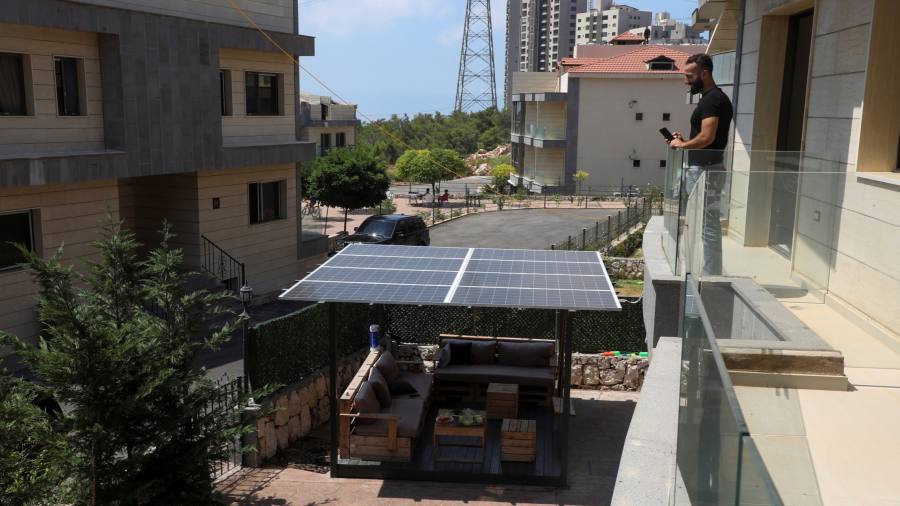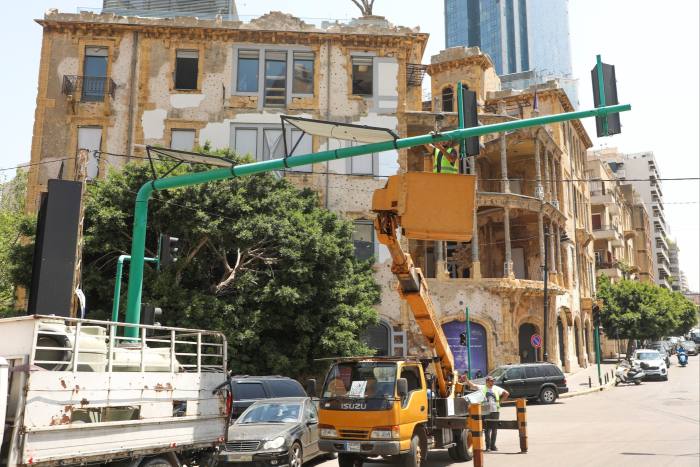
Customers buying dairy products used to make Lebanese shopkeeper Sabah Hashem nervous.
Over the spring the fridges at his mini-market were usually off for more than half the day: electricity from the state-run utility had trickled to a near halt and the operator of his back-up generator was rationing supplies as diesel costs rose.
“I had to open yoghurt in front of customers before selling it to them to make sure it hadn’t soured,” 39-year-old Hashem said at his shop in Hasbaya al-Metn, a village 20km east of Beirut. “I was up all night worrying I’d make my customers sick — you can’t run a business like that.”
As another summer without power loomed, Hashem had had enough. He pooled his savings and borrowed cash from a friend living abroad to install a 2kW solar energy system on the roof of his shop — enough to power the lights and two fridges 24 hours a day. It cost $3,700 but the outlay was worth it: “Now I sleep easy.”
Lebanon is mired in an economic crisis that has seen the Lebanese pound lose more than 95 per cent of its value against the dollar since October 2019. The rising costs of fuel imports, exacerbated by Russia’s invasion of Ukraine, have contributed to state-run Électricité du Liban’s inability to provide regular power.
Hashem is one of tens of thousands of Lebanese people who have turned to solar power in the absence of reliable electricity supplies from EdL. Panels have sprouted everywhere, from urban rooftops to rural monasteries and on electric scooters, to take advantage of Lebanon’s 300 days of sunshine a year.
“It’s sad to say, but a turn to cleaner energy is a benefit of the complete breakdown of the state,” said Wael Bitar, managing partner of EbCo Bitar, a contracting company that diversified into installing solar power in 2020.

The solar boom is a byproduct of Lebanon’s crisis. Private installations in businesses and homes since 2020 will have added 350MW of renewable power — about 5-7 per cent of Lebanon’s annual energy needs — by year-end, said Pierre El Khoury, head of the state-affiliated Lebanese Center for Energy Conservation. Small-scale projects, many by the UN and NGOs, added just 100MW of solar power between 2010 and 2020, he added.
At the COP27 climate conference in Egypt, Lebanon reaffirmed pledges to source 30 per cent of its energy from renewables by 2030. But industry experts say international financing for 11 solar projects approved in May depends on the finalisation of a $3bn IMF rescue package. The package is itself contingent on reforms, including at EdL, that have yet to be adopted by the caretaker government. Since 1992, electricity spending has accounted for 40 per cent of government debt, according to a 2021 study.
EdL announced a price rise last week, a step officials said will eventually help the state afford fuel to fire up power plants and increase supply.
Some 700 companies are now licensed to install solar, up from 130 in 2020, according to the LCEC. Installations make up 20 per cent of Bitar’s revenue. “When the state was giving subsidies for renewables before the crisis, most of my clients weren’t interested. Electricity was cheap and nobody cared,” he said. “But now everyone’s doing solar.”
A basic household set-up sufficient to run several appliances such as fridges costs $2,000-$3,500, down 15-20 per cent since 2020 because of a glut of panels and increased competition, according to multiple installers. Prices can reach $15,000 depending on the size of the property and quality of the system, while commercial projects can cost up to $200,000.
The prices are still prohibitive for many, leading to a surge in unlicensed and unsafe installations. “Your vegetable seller, your cab driver, your unemployed young guy — they’re watching YouTube videos, buying panels and offering cheaper services,” said Bitar.
Meanwhile, generator operators, long Lebanon’s sole providers of alternative power, are struggling. Jammal Amer, who runs neighbourhood generators in the southern district of Zahrani, said he started the year with 1,000 clients, including municipalities, but has lost more than 700 since the spring — “90 per cent of them to solar” as fuel costs rise.
Amer charges L£1mn (about $25 at current market rates) a month for four-five hours of power a day — half the monthly wages for most of his clients, who cannot afford the upfront costs of solar energy.
Lack of a legal framework hampers wider adoption of renewable energy, experts say. Although small-scale use is allowed, solar energy producers are prohibited from connecting to EdL’s grid or selling spare power to neighbours. A bill to address this has stalled in Lebanon’s parliament.
“We need serious reforms for a proper energy transition. It’s going to take years to integrate all of these individual systems into the grid,” said Laury Haytayan, a Lebanese energy expert at the New York-based Natural Resource Governance Institute.
Haytayan added that Lebanese citizens’ unplanned switch to solar “means we’re removing the pressure on our government to do its most basic job”.
The shortfall in state supplies exacerbates inequality for those who cannot afford alternative sources of power. Mariam Hassan, a beautician living in a southern Beirut slum, has been without electricity since May. Her monthly wage, equivalent to $150, can no longer stretch to cover her children’s schooling and generator fees.
Hassan’s siblings bought her a small solar-powered battery this summer so she could charge her phone and keep her business afloat. But when it broke she could not afford the $100 to fix it. Her neighbours have taken out interest-free loans with Hizbollah’s microfinancing arm, al-Qard al-Hasan, to install solar systems, “but you need to guarantee them with gold and I’ve already sold everything”, she said.
“All anyone speaks about today is solar. But for those of us who can’t afford it, we’re living and dying in darkness.”